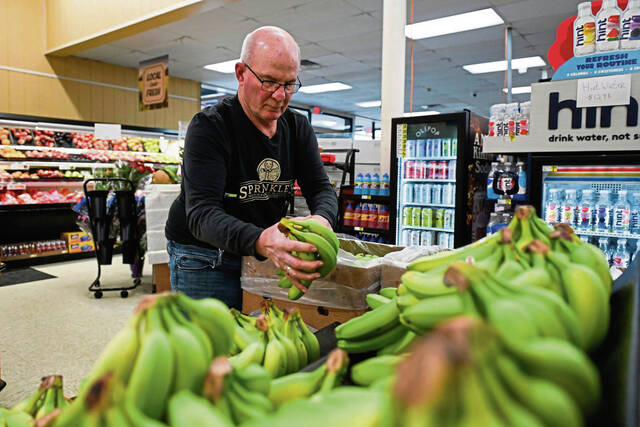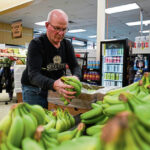Many consumers and business owners across Western Pennsylvania responded Wednesday with a sense of relief to President Trump’s decision to pause most of his hefty reciprocal tariffs on imported goods — and the stock market responded with historic gains.
But the 90-day pause doesn’t apply to China, one of the top suppliers of goods to the United States, and it remains unclear what the future holds should new trade deals not be reached with other countries in the next three months.
“What does that mean in 90 days?” said Risa Kumazawa, associate professor of economics at Duquesne University. “The same anxiety level and the same level of uncertainty in the economy.”
Terrence Guay, an international business professor at Penn State who serves as director of the university’s Center for Global Business Studies, said Trump’s 90-day pause adds to the unpredictability of what has been a roller-coaster ride of a situation. It likely will leave suppliers guessing, he said.
“Businesses absolutely cannot plan in an environment where tariffs are imposed and then removed or lowered, but still left in place — and increased — for some countries like China,” he said. “If one of Trump’s main goals is to bring manufacturing back to the U.S., this approach will not work.”
Guay predicted foreign companies would be reluctant to invest billions or even millions of dollars in the United States if they feel U.S. policies, good or bad, will be in place one day and gone the next.
For Western Pennsylvania businesses, shifting policies also impact their ability to plan. One way they might try to hedge against economic volatility is to buy inventory now while prices may be lower, officials said.
“That’s one of those things we’ll talk about this week — is there a list of 10 or 12 pallet items we’re going to buy anyway?” said Randy Sprankle, who owns and operates Sprankle’s Neighborhood Market in Leechburg.
Giant Eagle has identified produce, coffee, nuts, seafood and anything not easily grown or produced in the U.S. as goods that could rise in cost, according to spokesperson Jannah Drexler. The company also is keeping an eye on products with imported ingredients or packaging materials.
“Importantly, we can confirm that Giant Eagle has not made any tariff-related price changes to date with the exception of a handful of battery and bagged herbal tea items,” Drexler added.
“I’ve had a lot of phone calls asking if prices are going up,” said Dave Fitzgerald, owner of Dave’s Appliance in Vandergrift. Worried callers have been relieved to learn he expects little change because all of his products are assembled with limited foreign parts.
Some retailers already have seen tariff-related price hikes on staple goods. At LaMantia Produce Co. in Blairsville, the price of bananas and pineapples, both coming from South American countries, had increased by 10% since a universal 10% tariff on all countries took effect last week, said owner Mike LaMantia, who delivers to restaurants in the Greensburg area.
Tony Jioio, owner of Jioio’s restaurant in Hempfield’s Carbon neighborhood, said he has yet to see any price hikes on the produce he buys for the food he prepares, such as salads and pizza.
Distributors have not yet said whether higher costs are on the horizon.
“I don’t know if they know how to react,” Jioio said.
The 90-day pause gives the Trump administration time to try to negotiate new trade deals with other countries.
“Trump can say he started out tough against countries but now is willing to negotiate with most of them,” Guay said. “What ultimately is agreed with individual countries is likely to be minor, but Trump will call it a win because he got something in response to imposing tariffs to begin with.”
Despite the pause, Ryan Young, a senior economist with the Washington, D.C.-based Competitive Enterprise Institute, said, “The damage is still done. It’s good news, and I’ll take it, but let’s not pretend like we’re back to where we were.”
Uncertainty still abounds, Young said.
“Everyone’s confused,” he said. “Are (the tariffs) going to come back in 90 days? I don’t know. The White House probably doesn’t know.”
That uncertainty has filtered down to consumers, who say they are wondering what the future holds.
Latrobe’s Claire Kaczmarek said she isn’t certain whether she already has been impacted by the tariffs, but she added, “I’m sure it will (impact her) at some time” in the future.
“When I do go shopping, I do it as frugally as possible,” Kaczmarek said.
“I am buying a lot less — less of everything,” added Jeannette’s Evan Springer.
Despite the 90-day pause, Trump announced that the universal 10% tariff on all countries will remain in effect. He also boosted the duties on goods imported from China to 125%.
“(Consumers are) still paying more for clothes, cars and food but not as much more” as they would have had all the hefty reciprocal tariffs remained in place, he said.
Cars, specifically, are still going to cost $3,000 to $10,000 more than the average price, which has hovered around $40,000, according to Young.
Many cheap consumer goods are produced in China, Young said, which will affect large companies like Walmart and Amazon “heavily.” He added that many electronics, including iPhones and tablets, are assembled in China.
“It’ll affect the consumer quite a bit,” Young said. “The companies will try to absorb some of the cost … (but) the majority of tariff expenses do get passed on to the consumer.”
Because it’s unclear what the future holds for tariffs, Young suggested families might want to complete back-to-school shopping early because clothes are mostly sourced from Vietnam, Cambodia, Indonesia and Malaysia.
“If you have kids, do your back-to-school shopping now,” he said, adding that, because the next school year won’t start for more than four months, families with growing children should consider buying oversized clothing items.
He also said it would be a good idea to stock up on canned goods and nonperishable food items that have a longer shelf life, while Guay advised consumers to start saving more money and purchasing fewer luxury items.











